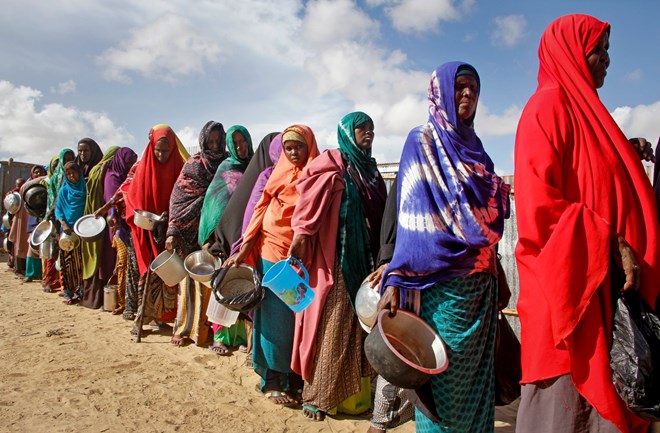Women lined up for food last month at a camp outside Mogadishu, Somalia, after fleeing drought-stricken areas.Credit...Farah Abdi Warsameh/Associated Press Justin Brady, head of Office for the UN Office for the Coordination of Humanitarian Affairs (OCHA) in Somalia warned that the political and security gains made by Somalia over recent years could be at risk of reversal if swift action is not taken to avert the crisis. "We have a situation of the two problems of floods and COVID-19 converging and reinforcing the impact on the population, and then we have the locusts," Brady said in a statement issued in Mogadishu.
Wednesday June 3, 2020
The UN official said Somalia's coping mechanisms are significantly less than those of the neighboring countries.
"Therefore, the impact of floods, locusts and COVID-19 is not simply humanitarian but has the potential to reverse some of the political and security gains that the international community has invested in over the past decade," said Brady.
According to the UN, about 500,000 people have been displaced by recent floods in Somalia's central regions, while the country is also dealing with a severe locust infestation which threatens food security and nutrition for many.
Somalia has also been responding to the COVID-19 pandemic's spread with the total number of confirmed cases reaching 2,089, 390 recoveries and 79 fatalities as of Tuesday.
The UN said the pandemic has led to major socio-economic disruptions across Somalia, including a reduction in remittances from the Diaspora, itself a mainstay for many Somalis, and a reduction in casual labor opportunities due to COVID-19 restrictions, making it difficult for many to cope.
"We need to continue to work together and expand the coordination with the private sector, civil society and have more engagement with the diaspora," Brady said.
He said the UN's warning takes into account Somalia's inherent structural weaknesses, which make the country far more vulnerable than the other countries in the region, and calls for an all hands on deck approach to avert the worst.
The Food and Agriculture Organization of the United Nations (FAO) said it has acquired equipment to help eradicate the locusts in infested areas in locations such as Hargeisa, Galmudug and Puntland. The infestation is Somalia's worst outbreak in 25 years.
The FAO Country Representative in Somalia, Etienne Peterschmitt, believes that the impact of the current desert locust outbreak in Somalia could, by September, increase the number of Somalis facing food insecurity or severe hunger by half a million.
Both OCHA and WHO have described the floods, locusts and COVID-19 as an unprecedented "triple threat," which needed adequate funding to fight against.
Somalia was already struggling with floods and an invasion of desert locusts in the northern parts of the country when COVID-19 struck, further aggravating the situation by putting pressure on the country's fragile health system, thereby causing a major public health crisis.
"Unless we are able to rapidly scale up our response operations, unless we get adequate funding from our donors, we will not be able to respond to this need of the government and that window is closing very rapidly," said the WHO Country Representative for Somalia, Mamunur Rahman Malik.
According to the UN, while some half a million people have been displaced, overall, more than a million people have been affected by flash and riverine floods in Somalia.
In March, Somalia launched the National Preparedness and Response Plan for COVID-19, seeking 57 million U.S. dollars for the next six months.